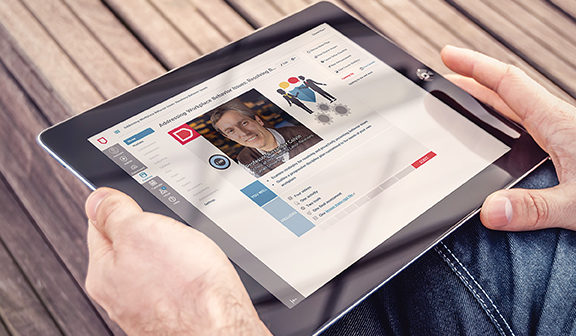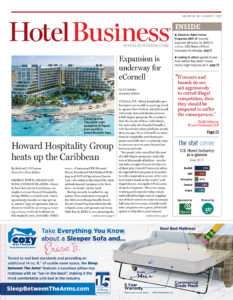ITHACA, NY—Many hospitality professionals are unable to pack up, head to upstate New York to attend Cornell University here and devote years to a full-degree program. To accommodate the needs of these individuals, the university developed eCornell, a web-based education platform, nearly 20 years ago. Now, eCornell has more than 10 hospitality certificate programs available and is exploring ways to increase peer-to-peer interaction between students.
“For people who can afford the cost of a full-degree program—typically tens of thousands of dollars—or who can take a couple of years to step out of their jobs, Cornell University offers an unparalleled program in hospitality with a reputation as one of the very best hotel schools in the world,” said Chad Oliveiri, eCornell’s VP of curriculum development. “However, many working professionals today simply can’t afford the high cost of stepping out of their careers to come to campus full-time for two years. Cornell certificate programs are a great, affordable option to help these professionals quickly upgrade their skills, while keeping their jobs. They can gain the specific expertise they need to advance their careers, without losing momentum.”
Cornell University founded eCornell in 2000, more than 17 years ago, in an attempt to provide professionals across the globe with the flexibility needed to enhance their skills. “Under this vision, eCornell has since grown rapidly, serving more than 130,000 students and today offering more than 120 courses in 40 certificate programs that teach today’s most in-demand skills in diverse industries,” he said. The platform serves both individual professionals and corporate partners, including Marriott, Hilton, InterContinental Hotels Group, AccorHotels, Best Western, Four Seasons and others.
“We’ve learned that the hospitality industry is in a constant state of flux, thanks primarily to advancements in technology,” he said. “This creates challenges from a catalog perspective, with the need to ensure that we are releasing courses that meet emerging needs as quickly as possible. It also requires diligence in the maintenance of existing courses where the course content is more volatile due to changes in the industry. We are able to overcome these challenges by maintaining regular, ongoing conversations with Cornell hotel school faculty as well as our students, who are very much in the thick of things.”
The online platform’s certificate categories include marketing, data science, leadership and strategic management, human resources, hospitality and foodservice management, finance and business performance, healthcare, plant-based nutrition and beekeeping.
Cornell faculty members develop eCornell’s online certificate programs, which are either suggested by Cornell faculty members or eCornell. “We work closely with faculty to develop and identify learning outcomes for each of the courses,” he said. “From there, we move into outline, content building and shooting in our onsite studios. Instructional designers work with a team of artists to enhance the lectures with supporting graphics and animations. Our development process concludes with faculty sign-off on all the content and a thorough run through of our quality assurance process.”
For the most part, industry leaders don’t advise eCornell on course material. “Its instructional designers partner with these faculty to translate their teaching and thought leadership into an engaging online learning experience,” he said. “Expert instructors with industry experience facilitate the courses day-to-day and grade assignments.”
Costs vary from certificate program to certificate program; however, the majority of eCornell’s programs concentrated on hospitality specifically cost $3,600. There are a couple of longer, more advanced programs in hospitality management and revenue management for $7,900. “We do offer monthly payment plans to help students afford the programs, at about $770 per month in the case of the $3,600,” Oliveiri pointed out.
Paying the full cost of the certificate program up front allows students greater scheduling flexibility (this is the route the majority of students choose, according to Oliveiri). “About 10% take advantage of the monthly payment plans we offer and pay on a per course basis,” he said. Some students also ask their respective companies to chip in for costs, as the skills acquired can potentially benefit more than just the student.
There are currently 11 certificate programs for students interested in the hospitality space. These programs are specifically tailored to professionals from entry level to new managers to senior executives, GMs and hotel investors. “These programs are especially relevant for professionals looking to prepare to move into a leadership role in the hospitality industry, or advance to a more senior level,” he said.
But is earning a certificate from one of eCornell’s programs looked upon differently than receiving a degree from Cornell’s hotel school? “Without question, a degree from Cornell’s hotel school provides an opportunity for in-depth study on campus and is extremely valuable in the market, as Cornell is widely recognized by employers everywhere as the gold standard in hospitality education,” Oliveiri said. “However, earning a full degree requires a significant financial and time commitment that isn’t realistic for every working professional. If you’re working a full-time job in the industry and can’t afford to step out, earning a certificate from Cornell’s hotel school through eCornell can also signify to employers that you have made an effort to expand your industry knowledge. Many of the same faculty members who teach in Cornell’s hospitality degree programs develop the online courses.
“We hear many stories of students who were promoted after getting a certificate,” he added.
Certificate programs are updated regularly to reflect current practices. Fourteen updates have been made this year alone.
“We have many new certificate programs in the works,” Oliveiri said. “We are rapidly expanding into the technology space, as well as launching new programs in each of our existing verticals. In the hospitality field, there will be new programs in F&B management, service excellence for leaders, hotel design, understanding the hospitality industry and hotel operations.”
The digital platform also offers WebSeries, live one-hour webcasts, covering a range of channels including entrepreneurship, nutrition frontiers, hospitality, human resources and women in leadership.
“We are always making innovations to our product and platform based on the needs of our students,” he said. “Right now, we are exploring ways to increase peer-to-peer interaction, group work and instructor support.” HB


